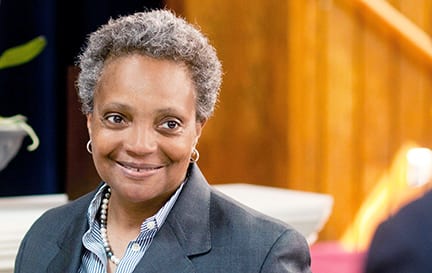On Monday morning, May 20, 2019, Lori Lightfoot was sworn in as Chicago’s 56th mayor. Alongside the new mayor was the City Council’s 50 aldermen — clapping, smiling, possibly seething a little — whose power she has vowed to diminish. Ms. Lightfoot, an outsider candidate who won nearly 75 percent of the vote to become mayor of the nation’s third-largest city, has made it her first major order of business to end what is known in Chicago as Aldermanic Prerogative.
That is an unwritten rule that gives aldermen unfettered zoning and permitting power in their own wards. It is also widely seen as an invitation to corruption. Many Chicagoans would like to do away with the practice, which is both unofficial and deeply ingrained in the city’s culture — as the Chicago Tribune put it recently, “the grease that oils the machine.”
Advocates of Aldermanic Prerogative, also known as “aldermanic privilege,” see it as a legitimate way for residents to have a real say in what happens in their own neighborhood through the decisive sway of their alderman on big things and little ones — a block party, a drive-through proposal, a new building. Detractors consider it a blatant, bizarre and laughable invitation for classic Chicago-style corruption and point to the latest investigation into the city’s longest-serving alderman as a case in point.
Ms. Lightfoot’s first move happens on Inauguration Day. “We’re going to introduce an executive order that directs city agencies to identify the ways in which they have given deference to aldermen. And by deference, I mean giving them this unchecked veto right. And directing them that this will no longer be an acceptable policy or practice in my administration.”
She was elected to kill the relics of Chicago’s political machine. “The machine was built to last. The machine was built on compliance and rewarding those who were part of the machine and aldermanic prerogative is absolutely one of the tools that were used to keep people in line.” It has opened the door to corrupt practices. “What will disappear is their unchecked veto right. And if you look at the number of aldermen who have been prosecuted for corruption over the years, clearly one of the unifying threads is an abuse of Aldermanic Prerogative.”
Aldermanic prerogative has a troubled legacy in Chicago. “I think it’s been corrosive, I think it’s been abused and I think it has prevented us from taking on and tackling some big citywide urgencies like creating housing that’s affordable for people all over the city. So I don’t think it’s a legacy that suggests it’s something we should salvage, it’s something we should modify. It’s something that we have to get rid of.”
But not the City Council. “There’s no question. This is a very deeply entrenched culture that’s built up over decades. It’s not going to disappear overnight. But what it depends on is complicity by the executive branch. And what our executive order will do is to end that role. There will certainly be instances where aldermen could get together and vote in a bloc and give deference to another alderman. But we’re going to work very hard to call those kinds of things out.”
The Inaugural ceremony brought thousands to Wintrust Arena to witness history in the making. Just before noon, Lightfoot was sworn in with her wife, Amy Eshleman, and daughter, Vivian, at her side. Thousands of members of the public attended the inaugural ceremony to participate and celebrate this momentous achievement in Chicago’s history. Lightfoot’s mom, Ann, also traveled along with Lori’s siblings, to be part of this historical moment.



